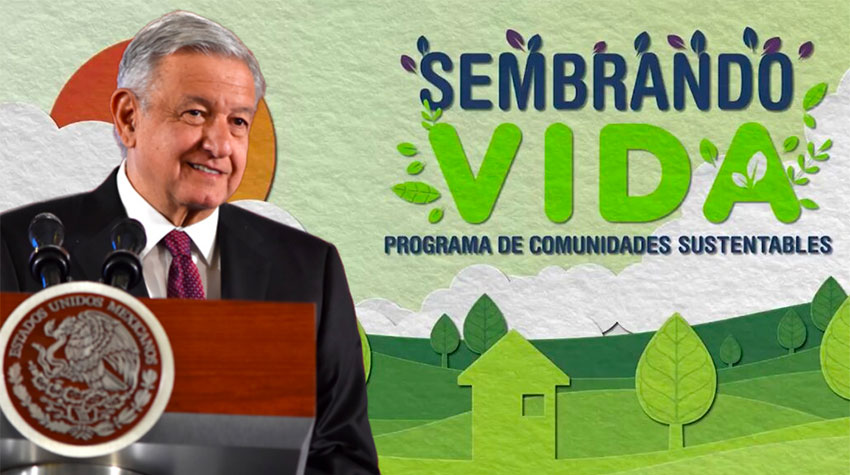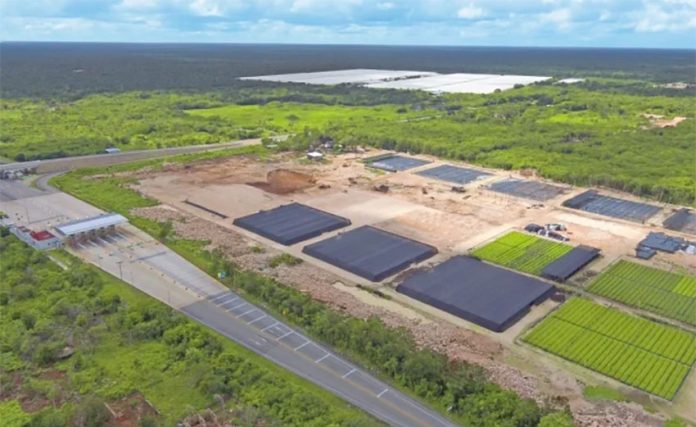The federal government’s tree-planting employment program is riddled with operational flaws and corruption, according to some participating farmers.
A report published by the newspaper El Universal says that many of the more than 230,000 farmers who are paid 5,000 pesos (US $230) a month to plant and tend fruit and timber-yielding trees have experienced a range of shortcomings in the Sembrando Vida (Sowing Life) program, one of the government’s most important social schemes.
They include the late distribution of saplings after the conclusion of the rainy season, a lack of water for irrigation, being forced to plant on drought-stricken land, the provision of dead saplings and a shortage of supplies and tools.
Ministry of Welfare documents obtained by El Universal via a freedom of information request support the farmers’ testimonies and suggest that the management of Sembrando Vida is based on improvisation rather than being guided by a well-thought-out plan.
Some farmers also say they have been forced to pay moches – cuts or kickbacks – to the on-the-ground officials in charge of the scheme.
Raúl Esteban, a farmer in Campeche, said he has been forced to make occasional payments of 100 to 200 pesos to the program’s operators, while Charly López of Tabasco said he has been threatened with removal from the program if he doesn’t pay the 50-peso monthly moches asked of him under the pretext that the cash will be used to buy supplies.
“Nobody questions anything because we live with the threat that they are going to remove us from the program. We hand over the money to avoid that,” said López, a 25-year-old farmer.
El Universal said there is also a lack of saplings to support the program, highlighting that nurseries operated by the army lack supplies, materials and tools to grow the number of young trees it requires.
The minutes of a meeting last September attended by members of the technical committee of the Sembrando Vida program indicated that “one of the most significant challenges” in the operation of the scheme was to ensure that the saplings are planted at a time when they have the best chance of not just surviving but thriving.
However, that goal is complicated by the fact that the number of saplings being grown is insufficient to meet demand, the minutes said. The program fell well short of its target last year, planting trees on 150,000 hectares of land, only just over a quarter of the goal of 570,000 hectares.
Minutes from a technical committee meeting in October said that it had not been possible to purchase all the tools and materials required for the program because suppliers’ capacities were exceeded.

One farmer said he was told by Sembrando Vida officials that he and other participants would have to buy their own seeds and saplings. Armando Cruz said he and other farmers were given about 200 saplings to plant on their land after they signed up in March 2019.
However, the farmers were subsequently told that they would have to purchase their own seeds and saplings out of their 5,000-peso monthly wage.
“I’ve spent up to 1,500 and 1,800 pesos a month so I’m left with 2,700 or 2,800 pesos to live off. … It’s nothing really, you can’t live off that but the technicians [the program officials] force us to dedicate ourselves 100% to the program; we can’t work in anything else,” Cruz said.
In response to the claims that the on-the-ground officials have committed acts of corruption, the Welfare Ministry said they are constantly supervised by superiors and corruption is not tolerated. It also said that new data about the program will be presented at a press conference this Thursday.
According to the president of the Mexican Network of Forestry Farming Organizations, another problem with the Sembrando Vida program is a lack of clarity with respect to how participants are selected.
Gustavo Sánchez said there is no public call for applications and it’s not clear what criteria are used to select participants. He added that there is no “external evaluation” of the recruitment process, a situation that allows corruption to occur.
Sánchez said that government financial support to combat poverty has traditionally been allocated in exchange for support at the ballot box and suggested that is still occurring.
“It’s a problem,” he said, adding that there is a lack of clarity about whether Sembrando Vida is an anti-poverty program, a reforestation scheme or an environmental assistance project.
Yet another problem with the scheme is that cases have been identified in which people have deforested parcels of land so that they can join it and thus collect a monthly salary from the government.
The practice – known in the context of the scheme as sembrando muerte, or sowing death – has occurred in several municipalities where the Sembrando Vida program operates, El Universal said.
Sergio Rivera, a member of a community organization in Veracruz, cited one case in which a coffee plantation was cleared in a mountainous region of the state so that locals could apply to participate.
The government has also been guilty of deforestation, ironically clearing trees from land in the Quintana Roo municipality of Felipe Carillo Puerto in order to set up a military nursery to grow saplings for Sembrando Vida.
Although trees were planted on just 150,000 hectares of land in 2019, President López Obrador said in December that the goal for 2020 is to plant one billion saplings on one million hectares.
However, the goal seems fanciful because an expansion of the program is likely to perpetuate and exacerbate the problems already identified and denounced by the participating farmers.
Source: El Universal (sp)
